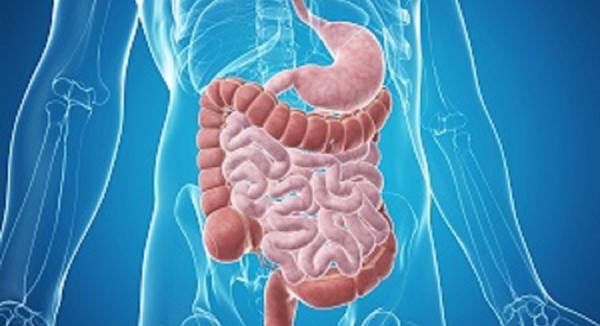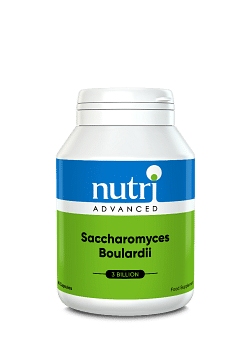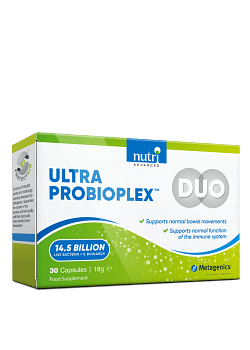Probiotics May Help Antibiotic-Associated Diarrhoea & C. Diff
Why you can trust Nutri Advanced Every article on our site is researched thoroughly by our team of highly qualified nutritionists. Find out more about our editorial process.
The complicated relationship we now have with antibiotics has become a real public health concern. Antibiotics are invaluable medications that save lives; in doing so however, they also destroy vital, health-promoting bacteria that make up the gut microbiome.
Once the gut has been wiped of bacteria (good and bad), it is then vulnerable to colonisation by more harmful opportunistic bacteria. In fact, antibiotic use is often associated with gastrointestinal side effects such as diarrhoea, and this is thought to be caused by alterations in the gut microbiome.
Anyone who has had a course of antibiotics is also at higher risk of developing Clostridium difficile infection, symptoms of which can range from mild to severe, and in rarer cases, can lead to a more serious condition known as pseudomembranous colitis.
About Clostridium Difficile:
Clostridium difficile bacteria live harmlessly in the gut of many people. Around 3% of adults and as many as 70% of healthy babies have small numbers of C. difficile living in their gut. This is usually kept in check by the higher numbers of beneficial bacteria that also live in the gut.
It is only when C. difficile is able to multiply, such as following a course of antibiotics that it can start to cause problems. There are several different strains of C. difficile, and some can cause a more serious illness than others.
A mild infection commonly causes symptoms such as stomach cramps and diarrhoea, and these can last anywhere from a few days to a few weeks. In mild cases, symptoms will often clear on their own, without any specific treatment. However, C. difficile bacteria produce toxins that can cause damage to the inside lining of the lower gut; symptoms can become more severe and in rarer cases lead to a more serious condition known as pseudomembranous colitis.
C. difficile infection is more common in older people, and has also become more prevalent in children in recent years. Infection is also more common in those taking medication to suppress stomach acid production.
Anyone who has had a course of antibiotics is at risk of developing Clostridium difficile infection. C. difficile is also the most common cause of hospital acquired infections.
Probiotic supplementation has emerged as a potential strategy to help minimise the negative effects of antibiotic therapy. Here we take a closer look at research where supplementation with specific live bacteria strains and Saccharomyces boulardii was found to reduce antibiotic-associated side effects and to be a useful addition to standard treatment for Clostridium difficile infection (CDI).
• Clostridium Difficile infection - In a 2017 pilot, randomised controlled trial published in the Journal of Antimicrobial Chemotherapy, researchers evaluated the effects of the addition of probiotic supplementation to standard treatment for CDI. 33 participants were involved in the study to determine the feasibility and health outcomes of adjunct probiotic use in patients with an initial mild to moderate CDI. Participants were assigned to receive either a 28 day, once daily course of a four-strain oral probiotic capsule containing Lactobacillus acidophilus ®, Lactobacillus paracasei Lpc-37, Bifidobacterium lactis Bi-07 and Bifidobacterium lactis Bi-04 or placebo. The results showed that adjunct probiotic therapy was associated with a significant improvement in diarrhoea outcomes compared to placebo. The researchers concluded that probiotics are a promising adjunct therapy for treatment of an initial CDI and should be further explored in a larger randomised controlled trial.1
• Reduce antibiotic-associated gastrointestinal symptoms & diarrhoea - In a 2012 randomised dose-response study, researchers evaluated the effects of a four strain probiotic combination (Lactobacillus acidophilus NCFM®, Lactobacillus paracasei Lpc-37, Bifidobacterium lactis Bi-07 & Bifidobacterium lactis Bi-04) on the incidence of antibiotic associated diarrhoea (AAD) and C. difficile associated diarrhoea (CDAD). Over 500 adult in-patients requiring antibiotic therapy were randomised among three study groups taking either a high dose four strain probiotic, low dose four strain probiotic or placebo. Researchers found that the four strain probiotic combination appears to lower the risk of AAD, CDAD and gastrointestinal symptoms. The incidence of AAD was significantly reduced in the high dose group as compared to the placebo. Both probiotic doses were found to shorten the duration of AAD and the number of liquid stools. The higher dose was also found to reduce the incidence of bloating, fever and abdominal pain. The researchers concluded that the incidence of C. Difficile infection was also significantly reduced by the high, four strain probiotic dose.2
• Reduce antibiotic-associated diarrhoea - Saccharomyces boulardii is a non-pathogenic strain of yeast that has been classified as a probiotic. S. boulardii is resistant to antibiotics and so can be successfully used alongside antibiotics. The effectiveness of S. boulardii for the prevention of antibiotic side effects has been demonstrated in a number of human clinical trials and meta-analyses. In a study of 193 patients, administration of S. boulardii (1000 mg per day) from the beginning of antibiotic treatment and continued for 3 days after the course, significantly prevented the occurrence of diarrhoea compared to placebo.3 In another study of 338 patients taking antibiotics, S. boulardii (200 mg per day) significantly reduced the incidence of diarrhoea compared to placebo.4 The addition of S. boulardii (250 mg per day) to antibiotic treatment in children with otitis media and ⁄ or respiratory tract infections also significantly reduced the incidence of diarrhoea compared to placebo.5
Summary
Antibiotic use is associated with significant gastrointestinal side effects including diarrhoea and an increased risk of Clostridium difficile infection. This is thought to be caused, at least in part, by alterations in the gut microbiome. Research shows that supplementation with specific strains of live bacteria and Saccharomyces boulardii may be a useful support strategy to minimise negative effects of antibiotic therapy.
References:
1. Ouwehand AC, DongLian C et al. Probiotics reduce symptoms of antibiotic use in a hospital setting: A randomised dose response study. Vaccine 32 (2014) 458-463
2. Barker AK, Duster M et al. A randomised controlled trial of probiotics for Clostridium difficile infection in adults (PICO). J Antimicrob Chemother 2017 Nov 1; 72(11): 3177-3180. Doi: 10.1093/jac/dkx254
3. Surawicz CM, Elmer GW, Speelman P, et al. Prevention of antibiotic-associated diarrhoea by Saccharomyces boulardii: a prospective study. Gastroenterology 1989; 96: 981–8.
4. Adam P. Essais cliniques controle´s en double insu de l’ultra-levure lyophilise´e (e´tude multicentrique par 25 me´decins de 388 cas). Me´d Chir Dig 1976; 5: 401–6.
5. Kotowska M, Albrecht P, Szajewska H. Saccharomyces boulardii in the prevention of antibiotic- associated diarrhoea in children: randomized double-blind placebo- controlled trial. Aliment Pharmacol Ther 2005; 21: 583–90.</spa
This website and its content is copyright of Nutri Advanced ©. All rights reserved. See our terms & conditions for more detail.
Nutri Advanced has a thorough research process and for any references included, each source is scrutinised beforehand. We aim to use the highest value source where possible, referencing peer-reviewed journals and official guidelines in the first instance before alternatives. You can learn more about how we ensure our content is accurate at time of publication on our editorial policy.
Most Popular Articles
-
7 Surprising Ways To Support Your Magnesium
If you are displaying signs of a magnesium deficiency, here are 7 ways to boost your magnesium levels that are easy to incorporate into your daily life. -
5 Best Vitamin C Supplements Picked By Our Experts
Learn more about the different types of vitamin C, the different benefits you get from different types, and what you get for spending more on a good supplement. -
Top 5 Vitamins For Energy And Tiredness Picked By Our Experts
The 5 best and most important vitamins for energy & tiredness including B vitamin food sources & best supplement forms for energy. -
Benefits of Myo-Inositol for Polycystic Ovary Syndrome (PCOS)
In this research review article, we take a closer look at a lesser-known natural compound called myo-inositol that has been found to have significant potential to improve many of the prevalent features of PCOS. -
Top 10 Reasons to Give Your Kids Omega-3
Read the top 10 reasons that kids should have plenty of Omega-3- an essential fatty acid- including for depression, brain function, sleep & reading/maths skills.















